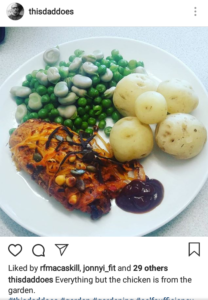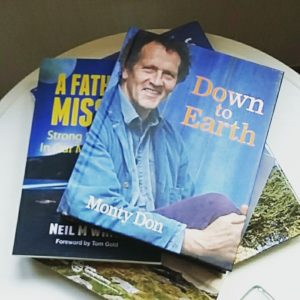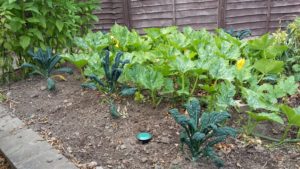My Gardening Philosophy – The Art of Self Provision
If you like reading my gardening articles, then you’re in for a treat as I’ve been working away at something which I’m now ready to unveil. And if you’re not into gardening, read it anyway, you might learn something….
This series of posts has been a while in the making. Not that I’ve been writing for weeks. It’s more been a progression of ideas that started as a seed a number of weeks ago that has been growing slowly and I’m now ready to show you what it has become.
I’ve written on and off about gardening but a while back decided I had enough posts for a separate category on the blog. And since then this part of my writing has really grown. Several of my gardening posts are really popular and get hundreds of views every month.
It’s easy to write about something you’re passionate about. And man, am I passionate about growing stuff.
But I’m also a pragmatist and not particularly sentimental. So I’ve never seen much point in having a garden that wasn’t of use. And by use, I mean edible. Which is the way I garden now – primarily focused on growing food.
That’s not a new thing for me either. I’ve been growing vegetables since I was a very young boy – five or six years old. My father even gave me my own plot where I could grow anything (and I mean ANYTHING) I wanted. There aren’t many Dads who would do that.
Then there were a few years when I didn’t have a garden or liked partying. Or both. Oh, and there was a time I lived in rural east Africa and grew almost all my own food (with the help of my full time gardener and mentor, Okethi). Gardening in Africa was easy – you put something in the ground and it grew – bananas, tomatoes, beans, corn, squash – whatever you wanted, you could grow it.
Since I read the cult gardening book ‘Grow or Die’ I’ve been fascinated by the idea of growing vegetables for survival. If our world went into melt down, how would we survive? We’d need food wouldn’t we?
This fascination was compounded by reading further and more widely with writers like Steve Solomon, who invented COF (Complete Organic Fertilizer) and others who promote permaculture and ‘no-till’ types of vegetable growing. Self sufficiency seemed inviting and romantic but was it realistic or attainable?
Everything But the Chicken – A Journey Away from Self-Sufficiency
About twelve months I was sitting down to a meal of chicken, broad beans (Yanks call these fava beans – I’m not sure why), potatoes and peas. I realised with some surprise that everything but the chicken had come from my garden.
This was a big moment – a few months earlier we’d moved into our new house and the garden had been a semi frozen wasteland of mature shrubbery, bark mulch and weeds. Over the following weeks we’d hacked, slashed and dug bringing a vegetable patch into being through the sweat of our brows.

In this patch of Scottish dirt, I’d grown my first food since leaving Africa seven and a half years before. This plate of chicken and vegetables tasted sweeter than anything I’d eaten. It was the taste of success.
Was this ‘Everything but the chicken‘ moment a route on the way to complete self-sufficiency?
My main experience of a self-sufficient lifestyle was through re-runs of the BBC comedy ‘The Good Life‘ in which a young, jet-setting couple left their London city careers to start a self sufficient life in the suburbs. It was hilarious, mainly because they failed at nearly every turn.
So was this foray into self-sufficiency a realistic way to live? Was it compatible with my day job, family life and desire to see my children well provided for?
Coming Down to Earth With a (Gentle) Bump
Things changed when I read the gardening and philosophy book by Monty Don (Monty is the slightly eccentric presenter of BBC’s Gardener’s World programme). His book, Down to Earth was a watershed moment in understanding what I wanted from my garden.
(Side note – Asking yourself ‘What do I want from this experience?’ is a good mindfulness technique that you won’t learn in school or anywhere else for that matter.)

Reading the book cover to cover, I came across this quote about the joy and satisfaction of growing your own food:
You become nourished by the earth, by your labour, by the intimate and unbroken connection with the ingredients themselves, and by the profound satisfaction of knowing that no one in an office constructed that meal as part of a profit-forecast spreadsheet – let alone used and abused labourers and abased them for a pitiful wage.
Whilst self-sufficiency is doomed to humiliating failure, self provision elevates the grower to self-esteem and a world of small but profoundly influential pleasures. – (My emphasis added)
This phrase ‘self provision’ stuck in my head. What did it mean? And could you shape an entire gardening philosophy around it? (Obviously I believe you can, that’s the whole point of this series of blog posts. But then if you got this far, you’ve probably figured that out by now.)

I actually think I’d been following the ‘Self Provision’ philosophy without realising it. And certainly without being to name it. But how would you define Self Provision Gardening? Maybe what you’re about to read describes how you garden. If so, that’s great. If not, have a think – maybe this is a good way to go.
What I’ve done is define Self Provision Gardening into broader concepts that I want to elaborate more on. I’m going to cover these concepts in posts that will follow this so keep checking back regularly to follow this series.
Neil
P.S. The best way to stay in touch is on my mailing list. You can sign up here.

I look forward to seeing where this goes.
Hey, thanks Neal. It’s a concept I’m keen to develop more. I’ve actually just written the next instalment here. Thanks for reading and commenting. I really appreciate it.